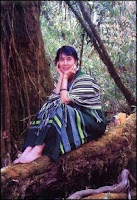Burma silence shows ASEAN is 'impotent'
By Danny Kemp in Bangkok
(News.com) -BURMA'S Southeast Asian neighbours have stayed largely silent over the trial of opposition icon Aung San Suu Kyi, in a fresh display of the bloc's impotence as a diplomatic force, observers say.
The Association of Southeast Asian Nations (ASEAN) has long pursued a softly-softly approach towards promoting democracy in its most troublesome member, in contrast to the tough sanctions preferred by Western nations. But it has little to show for its efforts since admitting Burma to the club in 1997, as the ruling generals have kept Aung San Suu Kyi under house arrest for years and brutally cracked down on protesters in 2007.
"We really hope that they come out and ratchet up the pressure. Since Burma was admitted 12 years ago, ASEAN has squandered any opportunity to speak more openly about Burma," David Mathieson of Human Rights Watch (HRW) told AFP, referring to the country by its former name.
Nobel Peace Prize laureate Aung San Suu Kyi faces trial on Monday on charges of violating the terms of her house arrest, after an eccentric American swam to her lakeside prison-home earlier this month. The charges prompted howls of protest from the West, but of Burma's fellow ASEAN members only Indonesia, Thailand, Singapore and the Philippines have issued condemnations of the junta's actions.
Philippines Foreign Secretary Alberto Romulo said today that he was "outraged" by the "trumped-up" charges.
Despite talks among ASEAN envoys in Rangoon, the 10-member group has still not issued any official pronouncement on the matter since the charges were announced on Thursday.
Mr Mathieson said the fact that such key members of the bloc had spoken out strongly "impels the group to come up with something," but added that it would still likely be a fairly toothless statement.
"It adds another layer of embarrassment," Mr Mathieson said, adding that the Burma issue had been a "central factor in spoiling relations within ASEAN for the last five years".
Human rights have been a perennial challenge for ASEAN in the 42 years since it was founded as a bulwark against the spread of communism, largely because of its oft-stated policy of non-interference in other nations' internal affairs. The latest debacle is especially embarrassing as it comes just months after the bloc adopted a new charter setting out benchmarks for democracy and human rights.
Burma analyst Aung Naing Oo said ASEAN had been effective in persuading the junta to accept foreign aid following last year's devastating Cyclone Nargis, which killed 138,000 people.
"They did help, they did play a key role after Nargis. But it is the only good thing they have done," said Aung Naing Oo, who is based in northern Thailand.
"Burma has been a thorn in ASEAN's side. They do want to do something, but quite obviously ASEAN has failed in many respects," he said.
Top officials from ASEAN and its six partners - China, Japan, South Korea, India, Australia and New Zealand - are set to talk about Burma on the sidelines of a regular meeting in the Thai tourist island of Phuket on Tuesday. But the latest issue is symptomatic of a wider Asian reluctance to act on Burma, with the major exception of Japan, which has strongly condemned the charges against Aung San Suu Kyi.
London-based Amnesty International urged the United Nations as well as China, Japan and ASEAN states to use their influence to secure her release.
"Now more than ever, the (UN) Security Council and ASEAN member states must send an unequivocal signal to the generals that they can no longer act with impunity," said the group's Burma expert, Benjamin Zawacki.
China, one of Burma's closest allies and a major consumer of its vast natural resources, has remained silent on the charges against Aung San Suu Kyi, as has India.
HRW's David Mathieson said however that China had taken "a lot of flak" at the United Nations and elsewhere over Burma and would probably use some behind-the-scenes pressure.
"China has a lot of leverage over Burma, although they are not willing to use it overtly. Privately they will say to Burma, 'just resolve this and move on'," he said.














